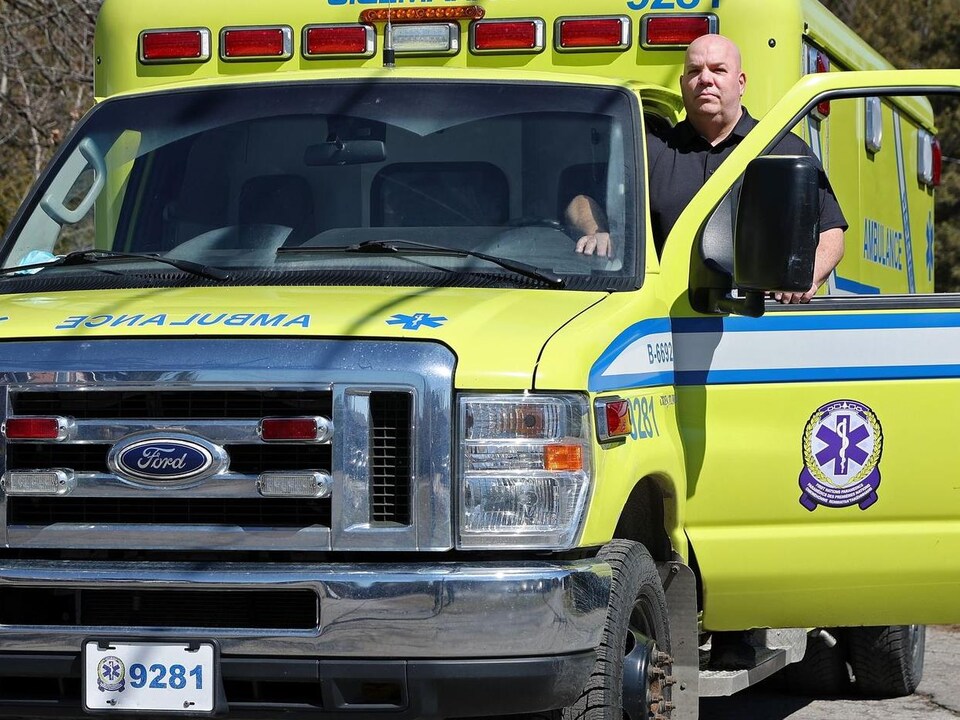After being involved in an accident on Saturday, Kanesatake’s Mohawk community ambulance has been out of service for days or even weeks, reviving the debate: why the only Aboriginal ambulance service in Quebec is can’t there be a vehicle recovery if all its competitors are entitled to it? The Ministry of Health is self -defensive.
On April 30, the band council of Kanesatake, in Montérégie, received bad news. His lone ambulance broke down while returning from Saint-Eustache hospital, after a collision with a passenger vehicle that failed to respect the mandatory stop.
Fortunately no one was hurt, but our ambulance lost action within a few days.said Robert Bonspiel, president of First Nations Paramedics (PPN).
His company was able to rent a replacement vehicle, but only for a short time. And he had to seek help from various ambulance services as he waited for his main vehicle to be fixed.
In the event of a breakdown, maintenance or accident, all other ambulance services in Quebec have the right to have an extra vehicle, known in the trade as a mule.lament of Mr. Bonspiel.
” How many times have we asked the Ministry of Health over the past 10 years to be eligible for it, but each time the government will tell us. “
Unlike its counterparts in Kahnawake or Akwesasne, the Kanesatake ambulance service is determined by the Ministry of Health and Social Services (MSSS), which pays for part of the costs associated with the vehicle, but Mr. Bonspiel points out that in cases from from, all operating costs (registration, maintenance, fuel) will be borne by the company. That is why he does not understand the rejection of the ministry.
On the ministry side, they replied that they agreed that Mr. Bonspiel’s company should have a vehicle from. But specified that Mr. Bonspiel wanted the ministry to cover all costs related to this cost. We don’t do thatsaid Marie-Claude Lacasse, public relations officer at MSSS.
” The company also requested that MSSS funded the purchase of the vehicle in the administration (rapid intervention). We agree to pay for radio communication, but we do not buy the vehicle for the companies. “
Ambulance companies are licensed private companies. It is their responsibility to carry out material managementends the ministry.
Upon learning of the department’s response, Mr. Bonspiel believed it was a communication problem. We understand that this second vehicle is unfunded and is in fact an older vehicle that has reached the end of its useful life.he writes. The permit we applied for is the problem. MSSS has denied this so far.
After 40 years as a paramedic, Hal Newan, now retired, continues to focus on issues related to his profession. Two months ago, he created the Facebook page The last ambulance which specifically addresses the issue of service delays.
” The only ambulance service in Quebec where the Ministry of Health has not given permission to have a second vehicle is the Aboriginal ambulance service. This creates a two -level health system and, in my opinion, illustrates the problem of systematic racism. “
The thorny issue of schedules
According to Robert Bonspiel, the department refuses his company to have a supplementary vehicle because it does not justify the volume of calls. If his company covers the Mohawk community and its environs (Saint-Placide, Oka, Saint-Eustache, Saint-Benoît, Mirabel, etc.), it represents a volume of approximately 500 interventions per year.
This number has been declining since 2017, since CAQ decided to improve the service contract of a competitor of Mr. Bonspiel: the company Services Préhospitaliers Laurentides-Lanaudière, based in Mirabel.
They have the right to hire paramedics who are paid according to the time permanently aboard their vehicle. That is why the automatic dispatch system is faster and favors them compared to our paramedics, who are considered on duty.lamented Robert Bonspiel.
Like many paramedics in remote areas, Mohawk paramedics are on the 7/14 schedule where they are considered called. Because they can be at home and still be available in case of an emergency, the dispatch system automatically calculates an additional 10 minutes of response time to give them time to get dressed and get to the ambulance.
However, in an area where private ambulance companies compete and a call is automatically taken to the ambulance that can be there the fastest, that’s 10 minutes of punishment create unfair competition, according to the Mohawk business leader.
On the subject of requests for change of shift schedules to hourly schedules, the ministry indicates the floor in this file. We are in the process of reviewing various requests for all regions of Quebec. An announcement will be made in due course.said Ms. Lacasse.
Source: Radio-Canada
